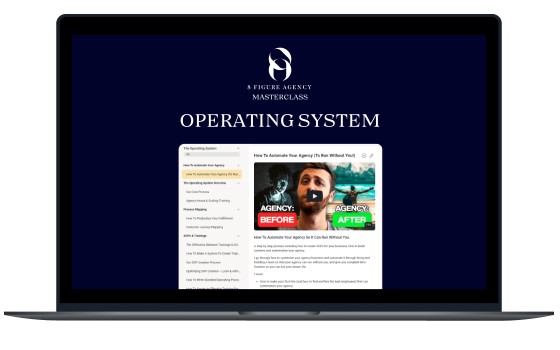The world of agency ownership is where visionary leaders dare to dream big and turn their aspirations into reality. As an agency owner, you stand at the helm of creativity, strategy, and innovation, guiding a team of talented individuals toward unprecedented success. But to navigate the turbulent waters of the business world and emerge victorious, you need a secret weapon – essential marketing leadership and management skills.
In this thrilling journey toward greatness, we will unravel the key pillars of effective leadership and management, equipping you with the tools to inspire, innovate, and overcome the challenges that lay ahead.
Get Started Today With 8 Figure Agency!
Marketing Leadership Skills
Marketing leaders need to possess the abilities and qualities that inspire and guide their marketing and sales teams toward business success. Leadership skills encompass a wide range of attributes, including communication, decision-making, emotional intelligence, adaptability, resilience, and more.
Building Trust and Credibility
Trust is the foundation of any successful relationship, including the one between a great marketing leader, and their team. Leaders must be honest, reliable, and transparent in their actions and communications. By demonstrating integrity and credibility, marketing leaders gain the trust and respect of their team members, which fosters a positive and productive work environment.
Developing a Clear Vision and Strategy
A strong marketing leader also provides a clear and compelling vision for the future. This vision outlines the organization’s purpose, values, and long-term objectives. Alongside the vision, great marketing leaders also must develop a well-defined marketing strategy to achieve the goals and keep their team aligned, including actionable plans and measurable milestones.
Communicating Effectively With Team Members
Communication is one of the core marketing leadership skills. Leaders must convey their vision and their marketing plan or strategy to their team in a way that is easily understood and inspires commitment. Additionally, effective leaders are skilled listeners, encouraging open communication and feedback from team members.
Encouraging Creativity and Innovation
A successful leader fosters a culture of creativity and innovation within their team. They encourage new ideas, value diverse perspectives, and create a safe space for team members to take calculated risks. This approach to marketing leadership can lead to breakthroughs and continuous improvement within the marketing department and the organization.
Empowering and Motivating Team Members
Empowerment involves delegating authority and responsibility to team members, allowing them to take ownership of their work. A good leader empowers their team members, by providing the necessary resources, support, and autonomy to accomplish tasks. Moreover, they motivate team members by recognizing their contributions, providing constructive feedback, and offering opportunities for growth and development.
Management Skills
Management skills refer to the set of abilities and competencies that enable individuals to effectively coordinate and oversee various aspects of an organization or a team to achieve specific goals and objectives.
Understanding the Agency’s Financials
Being financially literate enables managers to make informed decisions, allocate resources effectively, and ensure the agency’s financial stability and growth. From your profit and loss statement to your balance sheet, delving into the agency’s finances unveils the intricate dance of revenues, expenses, and assets. Armed with this invaluable knowledge, agency owners and managers can identify areas of improvement, seize opportunities, and optimize their strategies for sustainable success.
Planning and Prioritizing Tasks
Effective managers and marketing teams are skilled at planning and organizing tasks to help streamline operations and ensure that the team focuses on high-priority tasks and marketing activities.
Managing Time Efficiently
Managers should be adept at setting realistic deadlines, avoiding procrastination, and optimizing their schedules to maximize productivity and meet deadlines.
Building and Maintaining Client Relationships
Clients are the lifeblood of any agency. Managers and marketers must be proficient in building strong relationships with clients, understanding their needs, and ensuring their satisfaction with the agency’s services. Effective client relationship management contributes to client retention and positive word-of-mouth referrals and to generate leads.
Managing Team Performance and Productivity
Managers and marketing managers are responsible for setting clear performance expectations and marketing budgets, providing regular feedback, identifying strengths and areas for improvement, and offering support and training to help marketing team members excel.
Delegating Effectively
Effective delegation involves assigning the right tasks to the right individuals based on their skills and abilities, providing clear instructions, and empowering team members to take ownership of their work.
Technical Skills

Technical skills are specific, practical, and tangible, allowing individuals to use tools, technologies, and methodologies effectively to achieve specific objectives. In today’s rapidly evolving digital landscape, technical skills are highly sought after and play a crucial role in professional success.
Staying Up to Date With Industry Trends
Industries and technologies are constantly evolving, and professionals with technical skills must stay informed, relevant, and competent about the latest trends and advancements.
Understanding Digital Tools and Technologies
In today’s digital age, proficiency with various software applications, sales tools, and digital tools is essential across many industries. Technical professionals need to be adept at using tools for project management, data analysis, graphic design, video editing, and other specialized software relevant to their field.
Adapting to change
Technology and industry landscapes can change rapidly, and technical professionals must be adaptable and open to learning new skills to stay relevant and competitive.
Leveraging Data and Analytics
Data has become a valuable resource for businesses and organizations. Technical professionals with data analysis skills can interpret and leverage data to make companies make informed decisions, identify trends, and gain valuable insights into customer behavior, market trends, and operational efficiency.
Emotional Intelligence
Emotional intelligence (EI) is a concept that refers to the ability to recognize, understand, and manage one’s own emotions, as well as the emotions of others. It involves using emotional awareness to guide thinking and behavior, both personally and in social interactions.
Practicing Self-Awareness
Self-awareness is the foundation of emotional intelligence. Self-aware individuals can accurately recognize their emotional state and how it may influence their thoughts and actions.
Developing Empathy for Team Members
Empathy is the ability to understand and share the feelings and perspectives of others. In a team or marketing leadership role, empathetic individuals can connect with team members on a deeper level, recognize their needs, and respond with compassion and understanding.
Managing Conflicts Effectively
Conflict is a natural part of human interaction, but emotional intelligence helps individuals control their emotional responses during conflicts, actively listen to others’ viewpoints, and find collaborative solutions.
Building and Maintaining Relationships
Strong relationships are crucial in personal and professional life. Individuals can build rapport with others, communicate effectively, and nurture positive relationships built on trust, respect, and empathy.
Professional Development
Involves a proactive approach to learning and self-improvement, allowing individuals to stay relevant, adapt to changing environments, and reach their full potential.
Continuing Education and Learning Opportunities
In today’s rapidly evolving world, continuous learning is essential to keep up with industry trends and advancements. This can involve attending workshops, webinars, conferences, or enrolling in formal education programs.
Networking and Building Relationships
Building a strong professional network allows individuals to connect with like-minded professionals, industry leaders, potential mentors, and of course, to retain clients. Attending networking events, industry conferences, and online communities provides opportunities to exchange ideas, share knowledge, and open doors to new career prospects.
Seeking Mentorship and Coaching
Mentorship and coaching provide valuable guidance and support in a professional journey which then allows you to learn from their experiences, receive constructive feedback, and gain insights that can accelerate your growth and development.
Taking Risks and Learning from Failures
Professional development often involves stepping out of one’s comfort zone and taking calculated risks. Embracing challenges and trying new approaches allow you to view failures as learning opportunities and use them as stepping stones for improvement and future success.
Creating a Positive Workplace Culture
Creating a positive workplace culture is vital for fostering employee engagement, productivity, and overall well-being. A positive work environment not only contributes to the happiness of employees but also enhances organizational performance and attracts top talent.
Fostering a Positive Work Environment
A positive work environment is characterized by mutual respect, open communication, and a supportive atmosphere where employees feel valued for their contributions and ideas. This can also foster a sense of belonging and camaraderie among team members.
Encouraging Diversity and Inclusion
Embracing diversity and inclusion is crucial for a positive workplace culture. An inclusive environment where employees from various backgrounds, cultures, and perspectives feel welcome and valued, encourages diverse viewpoints and can lead to innovative ideas and better problem-solving.
Setting Goals and Celebrating Successes
Clearly defined goals and objectives give employees a sense of purpose and direction. Recognizing and rewarding hard work and achievements not only boosts morale but also reinforces positive behaviors and motivates employees to continue striving for peak operational excellence.
Recognizing and Addressing Challenges
Every workplace faces challenges, and it’s crucial to address them openly and transparently by actively listening to employees’ concerns and taking appropriate actions to resolve issues promptly.
Supporting Work-Life Balance
Balancing work responsibilities with personal life is essential for employee well-being and job satisfaction which leads to increased productivity and reduced burnout. Please see our suggestions on how to achieve this balance.
Building a Strong Brand

Building a strong brand is essential for any agency or company’s success. A strong brand creates a positive perception among clients and sets the agency apart from its competitors.
Defining the Agency’s Brand
The first step in building a strong brand and marketing campaign is to define what the agency stands for. This involves identifying the agency’s unique value proposition, target audience, core values, and mission.
Developing a Marketing Strategy
A successful marketer’s comprehensive marketing strategy should encompass various campaigns across both online and offline channels as this is crucial for building brand awareness and reaching the target audience effectively.
Creating a Compelling Message
Crafting a compelling brand message should be clear, concise, and resonate with the target audience. It should highlight the content marketing agency’s strengths and how it can address the client’s needs and challenges.
Consistently Delivering High-Quality Work
A strong brand is a company built on delivering consistent, high-quality services to clients. This will build trust and loyalty among customers, leading to positive word-of-mouth and repeat business.
Building a Strong Online Presence
In the competitive landscape of the digital age, having a focus on a strong online presence and creating valuable content reflects the agency’s brand identity and showcases the agency’s expertise.
Succession Planning
Succession planning is a strategic process that involves preparing for the future by identifying and developing potential successors to key leadership and managerial positions within an organization. It ensures a smooth transition of marketing leadership and management roles when current leaders retire, resign, or move on to other opportunities.
Planning for the Future
Succession planning is about thinking ahead and preparing for potential marketing leadership gaps in the future. It involves considering the long-term needs of the marketing director and organization and identifying the critical roles that require effective marketing leadership and management.
Identifying Potential Successors
The process begins with identifying employees who have the potential to step into key digital marketing leadership roles. This involves assessing their skills, experience, and potential for growth. Great leaders may already be part of the organization, or external candidates may also be considered.
Developing a Transition Plan
Once potential successors are identified, a transition plan is created to groom them for their future roles. This plan may include training, mentoring, job rotations, and exposure to different aspects of the organization’s operations to provide a well-rounded development experience for successful marketing leadership.
Preparing the Next Generation of Leaders
Succession planning is not just about replacing outgoing leaders but also about developing a pipeline of capable leaders for the future. By investing in the development of potential successors into good leaders, organizations ensure a continuous supply of skilled leaders to drive the organization forward.
Equipping Agency Owners With The Best Skills For 8-Figure Success
The importance of marketing leadership and management skills for successful marketing executives, leaders, or agency owners cannot be overstated. These skills are fundamental to guiding the agency, making strategic decisions, building a strong team, and achieving organizational goals. Effective marketing leadership and management create a positive work culture, drive productivity, and foster innovation.
Eager to harness the power of effective marketing leadership and management skills to drive your agency to new heights? Our team of seasoned experts is here to equip you with the essential tools, strategies, and insights needed to thrive in today’s competitive landscape.
With 8 Figure Agency by your side, professional development becomes an exciting and transformative journey.






